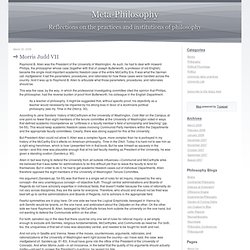

TheBuddhism.Net : Worldwide Buddhist Information and Education Network. Some people say Buddhism is a religion; some say it is a philosophy.

But it is none; but the realization of the truth. You will understand this when you go through the definitions of the words ‘religion’ and ‘philosophy’. Religion means 1. The belief in and worship of a superhuman controlling power, esp. a personal God or gods. 2. Philosophy means 1. 2. But our great Buddha and his teachings don’t belong to either category since he is a Human Being who developed his mind to the ultimate and realized the absolute truth of life and found the ultimate solution to all problems and suffering. Philosophy/Religion. Philosophy.
Catholic Philosphers. Utilitarianism. Resources. Meta-Philosophy. The sun was not yet coming up over Santa Monica Boulevard, but it had already been a long night of chai and I was looking for my car, which I had left on the street.

A newish Mercedes screeched to a stop just in front of me, and fearing the worstâLindsay LohanâI stumbled back in the direction of my chai house. Two odd looking men got out, and none too subtly gestured that I should get in the back seat. I say odd looking because, though they appeared to be clean and their hair and beards were neatly trimmed, they were both wearing togas. They were nowhere near young enough, and we were nowhere close enough to UCLA, for that to make sense.
"We just want to ask you some questions," said one, who was slightly balder than the other. "It won't take long," said the other, in the same accent, "and we'll bring you back here. We hummed along through the empty streets, in the direction of the Santa Monica Mountains. "So, how is life among the philosophers? " "I don't know," I said.
Leiter Reports: A Philosophy Blog. This is an excerpt from my Paolo Bozzi Prize address, "Realism and Moralism in Political Thought," last week in Turin at the conference on "Post-Truth, New Realism, and Democracy"; I'll put the whole paper on-line before long, but perhaps this bit will be of interest to some readers: Most of what we think we know about the world is due to reliance on epistemic authorities, individuals or institutions that tell us what we ought to believe about Newtonian mechanics, evolution by natural selection, climate change, resurrection from the dead, or the Holocaust.

The most practically fruitful epistemic norm of modernity, empiricism, demands that knowledge be grounded in sensory experience, but almost no one who believes in evolution by natural selection or the reality of the Holocaust has any sensory evidence in support of those beliefs. Instead, we rely on epistemic authorities—biologists and historians, for example. The Internet is, as we all know, the great eliminator of intermediaries. Philosophy with John Searle: Three Free Courses. Object-Oriented Philosophy.